 W
WField Marshal Sir Nigel Thomas Bagnall, was Chief of the General Staff, the professional head of the British Army from 1985 to 1988. Early in his military career he saw action during the Palestine Emergency, the Malayan Emergency, the Cyprus Emergency and the Indonesia–Malaysia confrontation, and later in his career he provided advice to the British Government on the future role of Britain's nuclear weapons.
 W
WField Marshal Sir Geoffrey Harding Baker, was Chief of the General Staff, the professional head of the British Army, from 1968 to 1971. He served in the Second World War and became Director of Operations and Chief of Staff for the campaign against EOKA in Cyprus during the Cyprus Emergency and later in his career provided advice to the British Government on the deployment of troops to Northern Ireland at the start of the Troubles.
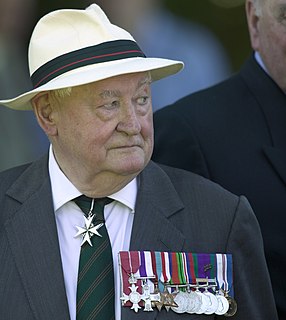 W
WField Marshal Edwin Noel Westby Bramall, Baron Bramall, was a British Army officer. He was Chief of the General Staff, the professional head of the British Army, between 1979 and 1982, and as Chief of the Defence Staff, professional head of the British Armed Forces, from 1982 to 1985.
 W
WGeneral Sir Nicholas Patrick Carter, is a Kenyan-born senior British Army officer. He served as commanding officer of 2nd Battalion, Royal Green Jackets in which role he was deployed to Bosnia in 1998 and Kosovo in 1999. After service in Afghanistan, he took command of 20th Armoured Brigade in 2004 and commanded British forces in Basra. He was subsequently appointed General Officer Commanding 6th Division, which was deployed to Afghanistan with Carter as Commander ISAF Regional Command South, before he became Director-General Land Warfare. After that he became Deputy Commander Land Forces in which role he was the main architect of the Army 2020 concept. Following a tour as Deputy Commander, International Security Assistance Force, he assumed the position of Commander Land Forces in November 2013. In September 2014, he became head of the British Army as Chief of the General Staff succeeding General Sir Peter Wall. In June 2018 he succeeded Air Chief Marshal Sir Stuart Peach as Chief of the Defence Staff.
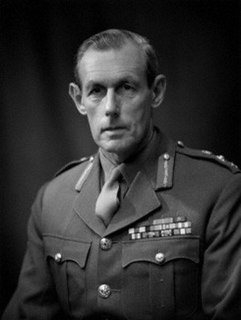 W
WField Marshal Richard Michael Power Carver, Baron Carver, was a senior British Army officer. Lord Carver served as the Chief of the General Staff (CGS), the professional head of the British Army, and then as the Chief of the Defence Staff (CDS), the professional head of the British Armed Forces. He served during the Second World War and organised the administration of British forces deployed in response to the Mau Mau Uprising in Kenya and later in his career provided advice to the British government on the response to the early stages of The Troubles in Northern Ireland.
 W
WField Marshal Sir Archibald James Halkett Cassels, was a senior British Army officer who served as Chief of the General Staff (CGS), the professional head of the British Army, from 1965 to 1968. As a young man he was a first-class cricket player, initially playing in India for the Europeans against the Hindus in the Lahore Tournament and going on to play for a Punjab Governor's XI against Northern India team and for a Viceroy's XI against the Roshanara Club. He later played for the British Army cricket team against the RAF at The Oval and then played for the Egyptian national side against HM Martineau's XI in Alexandria.
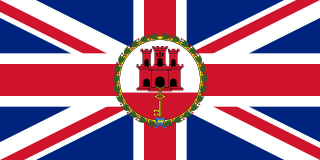 W
WField Marshal Sir John Lyon Chapple, is a retired British Army officer who served as Chief of the General Staff, the professional head of the British Army, from 1988 to 1992. Early in his early military career he saw action during the Malayan Emergency and again during the Indonesia–Malaysia confrontation and later in his career he provided advice to the British Government during the Gulf War.
 W
WChief of the General Staff (CGS) has been the title of the professional head of the British Army since 1964. The CGS is a member of both the Chiefs of Staff Committee and the Army Board. Prior to 1964 the title was Chief of the Imperial General Staff (CIGS). Since 1959, the post has been immediately subordinate to the Chief of the Defence Staff, the post held by the professional head of the British Armed Forces.
 W
WGeneral Francis Richard Dannatt, Baron Dannatt, is a retired senior British Army officer and member of the House of Lords. He was Chief of the General Staff from 2006 to 2009.
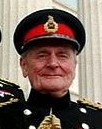 W
WField Marshal Sir Roland Christopher Gibbs, was Chief of the General Staff, the professional head of the British Army, from 1976 to 1979, and Lord Lieutenant of Wiltshire from 1989 to 1996. He saw active service in the Second World War and acted as chief of staff to the commander of the operation to evacuate all British troops and civilians from Aden during the Aden Emergency.
 W
WField Marshal Charles Ronald Llewelyn Guthrie, Baron Guthrie of Craigiebank, is a retired senior officer of the British Army who served as Chief of the General Staff from 1994 to 1997 and Chief of the Defence Staff from 1997 until his retirement in 2001.
 W
WField Marshal Sir Richard Amyatt Hull, was a senior British Army officer. He was the last Chief of the Imperial General Staff (1961–64) and the first Chief of the General Staff (1964–65), and, as such, the professional head of the British Army. He later became Chief of the Defence Staff (1965–67), the professional head of the entire British Armed Forces. He served with distinction during the Second World War, fighting from 1942 to 1945 in North Africa, Italy and Western Europe, became the youngest divisional commander in the British Army, and later advised the British government on the response to the Indonesia–Malaysia confrontation.
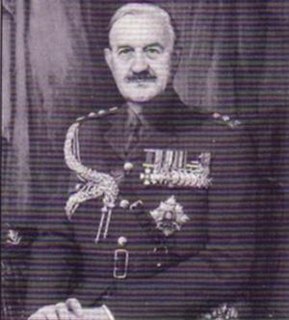 W
WGeneral Sir Peter Mervyn Hunt, was Chief of the General Staff, the professional head of the British Army, from 1973 to 1976. He served in the Second World War and commanded British Forces deployed in response to the Indonesia–Malaysia confrontation. Later in his career he provided advice to the British Government at a time of continuing tension associated with the Troubles in Northern Ireland.
Field Marshal Peter Anthony Inge, Baron Inge,, was the Chief of the General Staff, the professional head of the British Army, from 1992 to 1994. He then served as Chief of the Defence Staff before retiring in 1997. Early in his military career he saw action during the Malayan Emergency and in Northern Ireland and later in his career he provided advice to the British Government during the Bosnian War.
 W
WGeneral Sir Michael David Jackson, is a retired British Army officer and one of its most high-profile generals since the Second World War. Originally commissioned into the Intelligence Corps in 1963, he transferred to the Parachute Regiment in 1970, with which he served two of his three tours of duty in Northern Ireland. On his first, he was present as an adjutant at the events of the Ballymurphy massacre (1971), where 11 unarmed civilians were shot dead by British troops, and then at Bloody Sunday (1972), when British soldiers opened fire on protesters, killing 14. On his second, he was a company commander in the aftermath of the Warrenpoint ambush (1979), the British Army's heaviest single loss of life during the Troubles. He was assigned to a staff post at the Ministry of Defence (MoD) in 1982 before assuming command of the 1st Battalion, Parachute Regiment, in 1984. Jackson was posted to Northern Ireland for the third time, as a brigade commander, in the early 1990s.
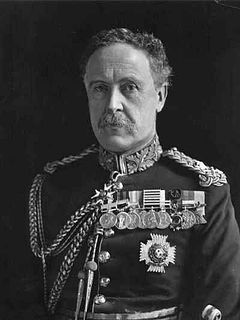 W
WGeneral The Honourable Sir Neville Gerald Lyttelton, was a British Army officer from the Lyttelton family who served against the Fenian Raids, and in the Anglo-Egyptian War, the Mahdist War and the Second Boer War. He was Chief of the General Staff at the time of the Haldane Reforms and then became Commander-in-Chief, Ireland.
 W
WGeneral David Julian Richards, Baron Richards of Herstmonceux, is a retired senior British Army officer who was formerly the Chief of the Defence Staff, the professional head of the British Armed Forces. He succeeded Air Chief Marshal Sir Jock Stirrup in this role on 29 October 2010.
 W
WField Marshal Sir John Wilfred Stanier, was a senior British Army officer who was Chief of the General Staff from 1982 to 1985. He was the first person after the Second World War to become the professional head of the British Army without having seen active service in that war or any subsequent campaign.
 W
WField Marshal Michael John Dawson Walker, Baron Walker of Aldringham, is a retired British Army officer. Commissioned in 1966, he served in Cyprus, Northern Ireland, and in a variety of staff posts in the United Kingdom until 1984. After being given command of a battalion, he was mentioned in despatches for his service during a second tour of duty in Northern Ireland, this time in Derry, and subsequently served a tour on Gibraltar. He was promoted to brigadier, unusually having never held the rank of colonel, and took command of 20th Armoured Brigade in Germany before becoming I Corps chief of staff.
 W
WGeneral Sir Peter Anthony Wall, is a retired British Army officer who served as the Chief of the General Staff, the professional head of the British Army, until September 2014. Wall had previously been the Commander-in-Chief, Land Forces from August 2009 to September 2010. He succeeded General Sir David Richards as Chief of the General Staff in September 2010, the latter going on a month later to be Chief of the Defence Staff.